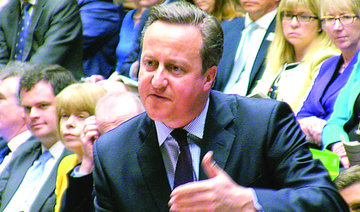MADRID/LONDON: Scores of world leaders will be sweltering in the summer sun of southern Spain next week at a once-a-decade United Nations development financing summit aimed at curbing global poverty, disease and the worst-case threats of climate change.
Despite the scorching temperatures, though, a major chill looms over the event – the decision early this month by the United States, traditionally the world’s largest aid giver and key finance provider, not to show up.
UN countries want to close a $4 trillion-a-year funding gap they now estimate prevents the developing world achieving the organization’s Sustainable Development Goals that range from cutting infant death rates to minimizing global warming.
Critics say the promises at the heart of the conference – called the “Seville Commitment” – are nowhere near bold enough.
The measures, agreed by consensus after a year of tough negotiations, include tripling multilateral lending capacity, debt relief, a push to boost tax-to-GDP ratios to at least 15 percent, and shifting special IMF money to countries that need it most.
The run-up, however, has been marred by the US decision to withdraw over what it said was the crossing of a number of its red lines, including the push to triple development bank lending, change tax rules and the use of the term “gender” in summit wording.
The European Union only joined the summit with reservations, particularly over how debt is discussed within the UN.
Speaking to reporters this week, UN Deputy Secretary-General Amina Mohammed described Washington’s boycott as “regrettable,” especially after its “catastrophic” recent aid cuts that she said had cost lives and livelihoods.
Speaking alongside officials from summit host Spain and Zambia, which has helped organize it, she said the final outcome document agreed reflected both “ambition and realism” and that the UN would try to re-engage the US afterwards.
Remy Rioux, chief executive officer of the French Development Agency, said Washington’s withdrawal had not been a total surprise given Donald Trump’s views. The hope is that agreements next week will allow bolder action at the UN climate talks in Brazil in November.
“We will push for the new framework... (and) its operationalization from Seville to Belem,” he added, referring to the Brazilian city that will host COP30.
Aid in decline
Other measures to be announced include multilateral lenders automatically giving vulnerable countries the option to insert repayment break clauses into their loans in case of hurricane, drought or flood.
Another buzz phrase will be a “Global SDR playbook” – a plan where the wealthiest countries rechannel the IMF’s reserve-like Special Draw Rights they hold to the multilateral banks, who then leverage them as capital in order to lend more.
Campaigners warn that it will fall far short of what is needed, especially as more than 130 countries now face critically high debt levels and many spend more on repayments than on health or education.
Aid and support from rich countries, who themselves have rising debts, is dropping too.
In March, the US slashed more than 80 percent of programs at its USAID agency following federal budget cuts spearheaded by billionaire Elon Musk. Britain, France, Germany, the Netherlands and Sweden have all made cuts in recent years too.
The OECD projects a 9 percent–17 percent drop in net official development assistance (ODA) in 2025, following a 9 percent decline in 2024.
It looks set to hit the poorest countries hardest: bilateral ODA to least developed countries and sub-Saharan Africa may fall by 13-25 percent and 16-28 percent respectively, the OECD estimates, and health funding could drop by up to 60 percent from its 2022 peak.
So what would be a good outcome in Seville, especially given the US pull-out?
“We should make sure we are not backtracking at this point,” said Orville Grey at the International Institute for Sustainable Development, referring to funding commitments. “We should at least remain stable.”

























